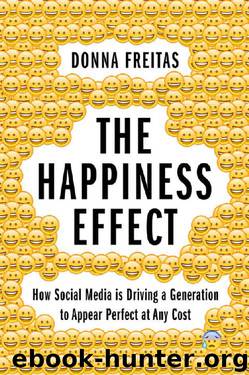The Happiness Effect: How Social Media is Driving a Generation to Appear Perfect at Any Cost by Donna Freitas

Author:Donna Freitas [Freitas, Donna]
Language: eng
Format: epub, azw3, mobi
Publisher: Oxford University Press
Published: 2017-01-30T22:00:00+00:00
IAN: TAKING PLEASURE FROM OTHERS’ PAIN
When Ian struts—and I mean struts—into the room, I realize that our conversation is probably going to be a little different than the ones I’ve had so far at his prestigious university. The vast majority of students I’ve met are serious, studious, dedicated, thoughtful, and rather sweet, the kind of young woman or man you’d imagine might attend a top-notch academic institution such as this. But Ian has swagger, and he also has the look of a stereotypical frat boy, complete with a bit of a beer gut sticking out from underneath his T-shirt. Sure, his majors (physics and applied math) are as demanding as those of his peers. But while his fellow students are thoughtful, reflective, occasionally socially awkward individuals, Ian seems like a guy who will say just about anything, including something potentially offensive, and then laugh it off like it’s no big deal.
In other words, Ian seems to lack a certain level of self-awareness or, at the very least, isn’t self-conscious about how he comes across to other people. He’s the same Ian who opined so colorfully about women’s propensity to take far too many selfies and share far too often.
Soon after we start talking, I learn that Ian actually is a frat boy—he’s a junior now, but he started pledging a frat a mere two weeks into his first year of college. He absolutely loves being in a fraternity and speaks at length about all the amazing people he’s met because of it. It’s also clear that Ian is just as serious about his studies—he’s thrived academically and loves being surrounded by smart people. Then Ian tells me that he’s an Eagle Scout and is still heavily involved in the Boy Scouts. “I work with a Boy Scout troop,” he says. “I’m very involved. I might become an assistant scoutmaster, but I have to go through some training. It’s a little bit of basic first aid, but also certain things like boundaries. So they like call it risk zones, so you know what to recognize if a kid, you know, is being bullied or something.”
So Ian is getting trained in how to respond to bullying—it’s one of the first topics he raises.
Ian goes on to talk about his hopes for the future—to be a good father, to have “a house big enough that can handle [his] hobbies,” to have a “project car” in the garage, a workshop there, too, and a place for his model trains. Ian loves model trains and lights up while talking about them. As Ian continues to discuss these things, he loses that swagger and frat boy–type attitude, seeming more like a sweet, excited kid who loves his majors and is thrilled by studying. But the swagger returns when the topic shifts to social media.
Ian rolls his eyes about all the embarrassing things that people put up on Facebook when they’re in middle school and high school—and he’s no exception. “Any sort of true candidness that people
Download
The Happiness Effect: How Social Media is Driving a Generation to Appear Perfect at Any Cost by Donna Freitas.azw3
The Happiness Effect: How Social Media is Driving a Generation to Appear Perfect at Any Cost by Donna Freitas.mobi
This site does not store any files on its server. We only index and link to content provided by other sites. Please contact the content providers to delete copyright contents if any and email us, we'll remove relevant links or contents immediately.
Rewire Your Anxious Brain by Catherine M. Pittman(17618)
Talking to Strangers by Malcolm Gladwell(11948)
The Art of Thinking Clearly by Rolf Dobelli(8896)
Mindhunter: Inside the FBI's Elite Serial Crime Unit by John E. Douglas & Mark Olshaker(7873)
Becoming Supernatural by Dr. Joe Dispenza(7141)
Change Your Questions, Change Your Life by Marilee Adams(6683)
The Road Less Traveled by M. Scott Peck(6670)
Nudge - Improving Decisions about Health, Wealth, and Happiness by Thaler Sunstein(6661)
The Lost Art of Listening by Michael P. Nichols(6509)
Enlightenment Now: The Case for Reason, Science, Humanism, and Progress by Steven Pinker(6432)
Win Bigly by Scott Adams(6340)
Mastermind: How to Think Like Sherlock Holmes by Maria Konnikova(6275)
The Way of Zen by Alan W. Watts(5828)
Daring Greatly by Brene Brown(5678)
Big Magic: Creative Living Beyond Fear by Elizabeth Gilbert(4761)
Grit by Angela Duckworth(4759)
Men In Love by Nancy Friday(4365)
Flow by Mihaly Csikszentmihalyi(4078)
The Four Tendencies by Gretchen Rubin(4042)
